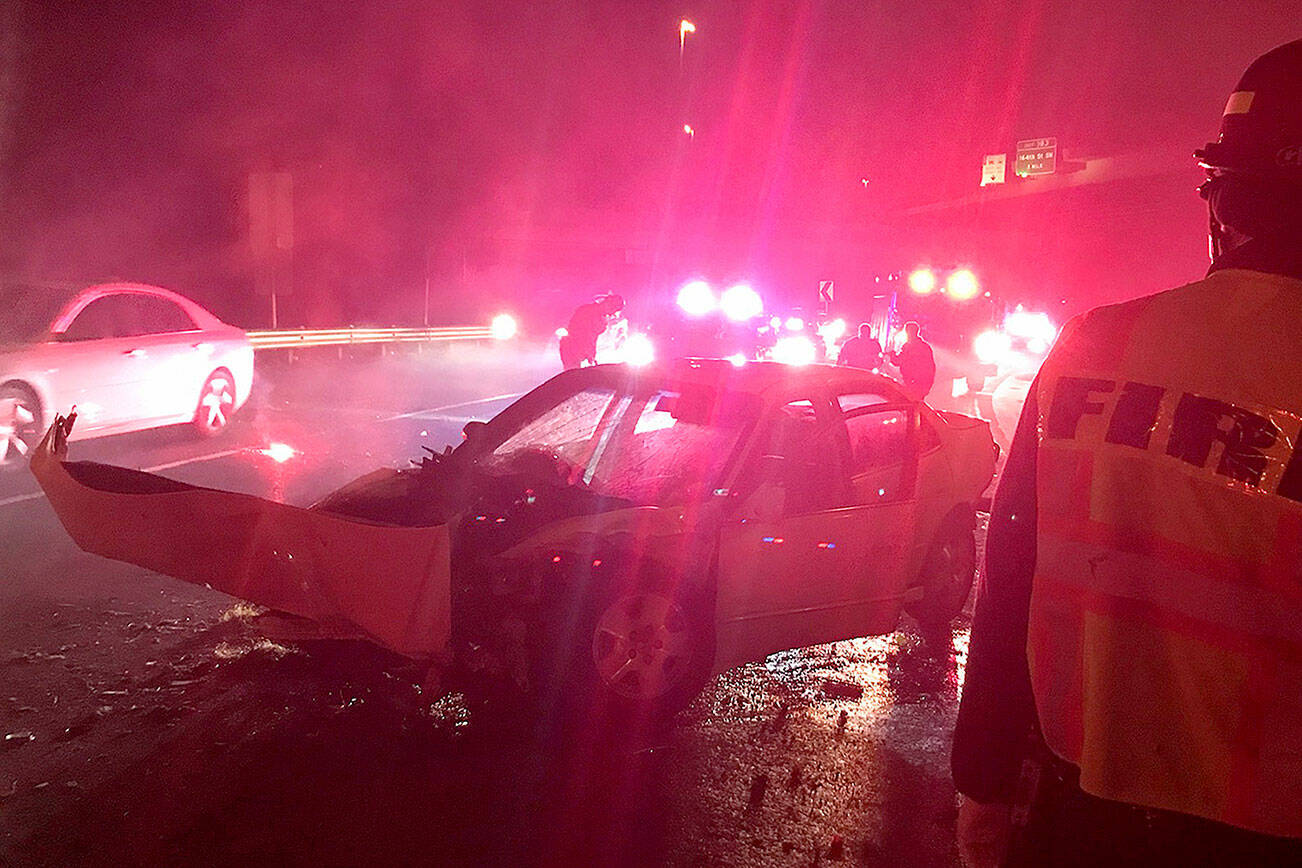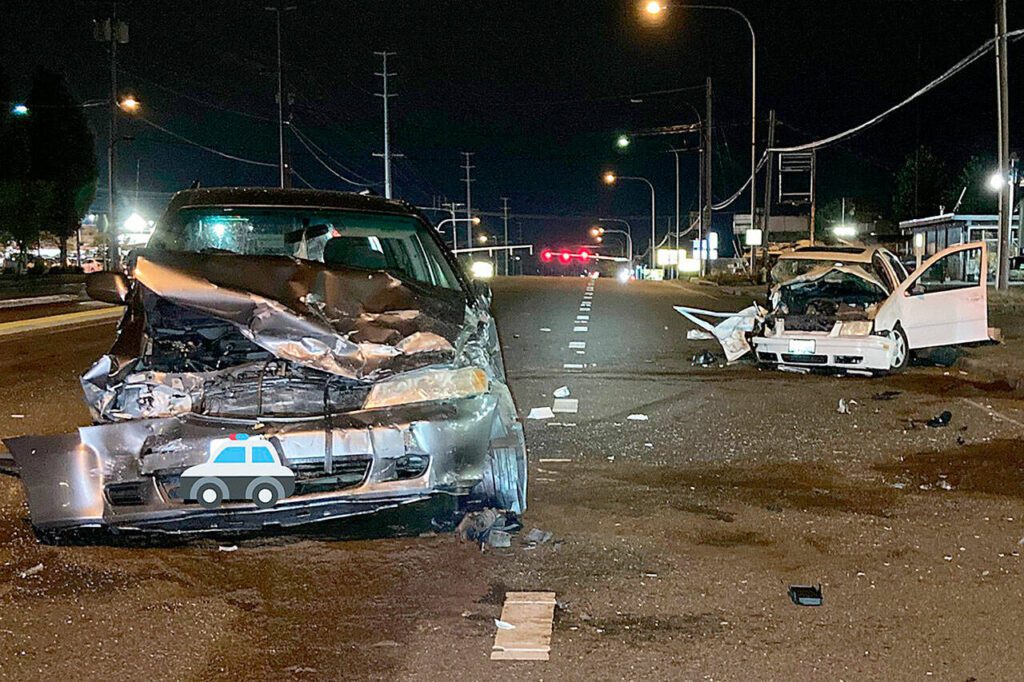By The Herald Editorial Board
It’s not a good sign when drivers in the state are logging fewer miles on roads but suffering more traffic fatalities than in recent years past.
Even as drivers traveled about 3 percent fewer miles between 2019 and 2022, traffic deaths — among drivers, passengers, motorcycle riders, cyclists and pedestrians — increased a total of 18 percent during the same period, according to an analysis of data from the National Highway Traffic Safety Administration and the U.S. Bureau of Transportation Statistics.
A total of 750 lives were lost in collisions on Washington roads in 2022, the deadliest year since 1990, according to the state’s Traffic Safety Commission. And as of July of last year, it had seen an increase to 417 fatalities in 2023’s first six months, greater than 2022’s pace for that period.
Meanwhile, Finland, with a comparable population — 5.5 million to Washington state’s 7.7 million — has seen its traffic deaths, already lower than Washington’s, decline from 270 in 2016 to 189 in 2022.
Those differences were notable enough to prompt a visit to Finland last month by a bipartisan contingent of state lawmakers and state transportation officials, including state Sen. Marko Liias, D-Edmonds, chair of the Senate’s transportation committee, with the intention of getting better perspective on what’s working in Finland and how it might be applied in Washington state.
And yes, in advance of the Legislature’s 60-day session, which starts Monday, this trip was necessary, Liias said.
“Going on Zoom, yes, you can see a PowerPoint presentation, but you can’t walk that streetscape or take a tour and look at how these environmental factors have contributed, or have a chance to ask 20 follow-up questions,” he said.
What the group came away with, he said, was confirmation on initiatives that are underway as well as tweaks to existing policies and some new approaches.
The top four reasons for traffic accidents in Washington state are no different than those in Finland: speeding, driver impairment, distraction and not using seatbelts.
“Those happen at much lower levels (in Finland) because of the techniques that they’ve adopted,” he said.
While all 50 states have lowered the legal blood alcohol concentration limit for drivers to .08 to combat impaired driving, the push is now on to go lower still. Utah has lowered its limit to .05, and Liias, joined by state Sen. John Lovick, D-Mill Creek, expects to bring back legislation — Senate Bill 5002 — introduced last year to set the limit at .05, as Finland did in 2011.
“We heard loud and clear from them that the single most effective thing they’ve done is they have a .05 blood alcohol limit. And they think that’s really central to the culture change that they’ve achieved, where people just really don’t drink and drive,” Liias said, opposed to an American culture that rationalizes that just a “couple of drinks” isn’t going to impair a driver.
“The thing about alcohol is it blurs your ability to know how much you drank and what your ability is,” he said.
Finland also takes a different tack on penalties for impaired driving, emphasizing less jail time but heavier fines that are scaled based on income. The fines also increase with the blood-alcohol level, taking steps between .05 and 1.2 and above 1.2, he said. Liias said the committee may look at graduated penalties based on blood-alcohol levels.
Another program that has worked for Finland is automated enforcement; traffic cameras. Helsinki, alone, with about 632,000 residents compared to Snohomish County’s 840,000, has 70 automated speed cameras throughout the city.
The use of traffic cameras in speed zones and intersections has been expanded in recent years in Washington state, beyond school zones and other limited areas. Cities have been allowed to expand their use. And this July traffic cameras located along highway construction work zones will begin issuing fines — up to $500, double the typical penalty — for speeding when workers are present.
The state Department of Transportation counted nearly 1,000 crashes in work zones in 2021, including 30 serious wrecks and five fatalities.
The effect of increasing the use of traffic cameras in Finland, Liias said, has meant slower speeds for all drivers, but an even greater decrease for those driving at even higher rates of speed, which can result in fewer accidents and reductions in injuries and deaths.
“The people driving 5 to 10 miles (per hour) over, that’s who you really want to discourage, because the roadway is not designed for it,” he said.
As well, the placement and spacing of cameras can persuade drivers to maintain lower speeds, even when they are out of range of the cameras.
Liias also expects lawmakers to continue to look at how to use street and roadway design to limit injuries and deaths, especially for pedestrians and cyclists. Nationwide, U.S. cities have seen a reversal in a steady decline in pedestrian deaths between 1980 and 2010, that has since returned to its 1990-era levels of more than 20 deaths per 1 million residents. Notably that rise is mostly attributed to collisions that occur after dark.
While a number of factors may be contributing to those night-time accidents, Finland, over more than 50 years, has worked to use street design to slow traffic and provide more distance, separating walking paths and bike lanes from roadways with planting strips and other spaces. Additionally roadways are narrower and speed limits lower, encouraging slower traffic that provides drivers more time to react to the unexpected.
Other legislation that is up for consideration this session:
Senate Bill 5514 would prohibit drivers from making a right turn on a red light at intersections near schools, child care centers, parks, senior centers, transit centers and other locations.
Senate Bill 5841, sponsored by Lovick, would require those convicted of impaired driving to pay financial support to minor children and dependents when the offense results in the death or disability of a parent.
Senate Bill 5872, also sponsored by Lovick, would set regulations for autonomous vehicles, including a requirement for a human at the wheel to monitor the vehicle’s operation.
Seeing the sad statistics in Washington state continue their climb, applying what has worked elsewhere provides assurance that similar steps can see success here.
“If we make these changes, they will have an impact,” Liias said. “This isn’t a hopeful endeavor. It’s one that’s research- and fact-driven, based on what we saw.”
Talk to us
> Give us your news tips.
> Send us a letter to the editor.
> More Herald contact information.


























